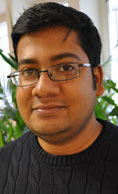Postal address: Enheten för infektionssjukdomar och hud, Institutionen för Medicin Huddinge, Karolinska Institutet, SE-141 86 Stockholm, Sweden
Visiting address: I73, Karolinska University Hospital, Huddinge
Web page: http://ki.se/ki/jsp/polopoly.jsp?d=40724&l=en
Contact person: Professor Anders Sönnerborg, Head of the unit, phone: +46 (0)8 585 811 49
The research at the unit is focused around studies on how the interplay between humans and micro-organisms results in disease and how this can be treated and prevented. The unit operates at Department of Medicine, Karolinska Insitutet at the Karolinska University Hospital in Huddinge. It is has gained international recognition within antimicrobial treatment and has a long tradition of global collaborations. The vision is to be a leading translational research center through which new treatments and diagnostics rapidly can be applied into clinical care.
South Asia related research
Prof. Sönnerborg’s research group on Infectious Diseases and Dermatology focuses on studies of translational, studying HIV-1 and hepatitis pathogenesis, treatment (cure, resistance) and molecular epidemiology from both an experimental and a clinical point of view. The group collaborates intensively with national and international partners. The experimental research is performed in close collaboration with the Division of Microbiology, Department of Laboratory Medicine, Karolinska Institutet. The infrastructure of the clinical research is the HIV cohort at Karolinska University Hospital and the national InfCare HIV database, which is also the basis for several European collaborations. Global collaborations are focused on aspects on HIV treatment and molecular epidemiology. They are performed together with partners in the EuResist consortium and several low-middle income countries (Ethiopia, Tanzania, Kenya, India, Bangladesh and Vietnam.
 On 11 June 2013, PhD candidate Ujjwal Neogi defended his doctoral dissertation entitled ”Translational Genomics of HIV-1 Subtype C in India: Molecular Phylogeny and Drug Resistance”. The thesis describes the translational genomics of HIV-1subtype C in India from its origin to therapeutic response with the aim to improve our knowledge for better therapeutic and preventive strategies to combat HIV/AIDS. In a systemic approach, we identified the molecular phylogeny of HIV-1 subtypes circulating in India and the time to most recent common ancestors (tMRCA) of predominant HIV-1 subtype C strains. More information.
On 11 June 2013, PhD candidate Ujjwal Neogi defended his doctoral dissertation entitled ”Translational Genomics of HIV-1 Subtype C in India: Molecular Phylogeny and Drug Resistance”. The thesis describes the translational genomics of HIV-1subtype C in India from its origin to therapeutic response with the aim to improve our knowledge for better therapeutic and preventive strategies to combat HIV/AIDS. In a systemic approach, we identified the molecular phylogeny of HIV-1 subtypes circulating in India and the time to most recent common ancestors (tMRCA) of predominant HIV-1 subtype C strains. More information.
Faculty opponent was Dr. Hervy Fleury, Laboratoire de Virologie, Université de Bordeaux, France. Venue: Lecture room 3/B63, Karolinska University Hospital, Huddinge. Professor Anders Sönnerborg was his main supervisor. The co-supervisors were Dr. Irene Bontell at the same department; Dr. Ayesha De Costa, Department of Public Health Sciences, Karolinska Institutet; and Professor Udaykumar Ranga at the Molecular Biology and Genetics Unit, Jawaharlal Nehru Centre for Advanced Scientific Research (JNCASR) in Jakkur, Bangalore, India.
Before joining PhD training at Ki, Ujjwal received a BSc degree at Dr. Babasaheb Ambedkar Marathwada University, Aurangabad, Maharashtra, Inda, and an MSc degree in Microbiology at Bangalore University. He also has 5 years experience as Junior Research Fellow at National Institute of Immunology, Govt. of India, New Delhi and Senior Research Fellow, at St. John’s Medical College (SJMC), Bangalore.